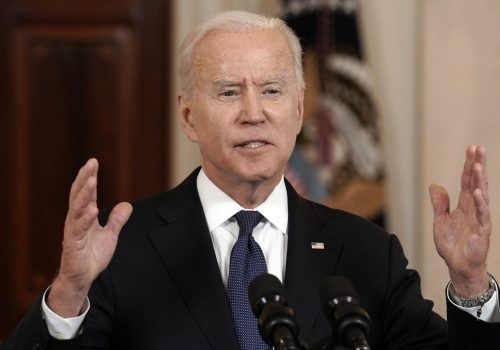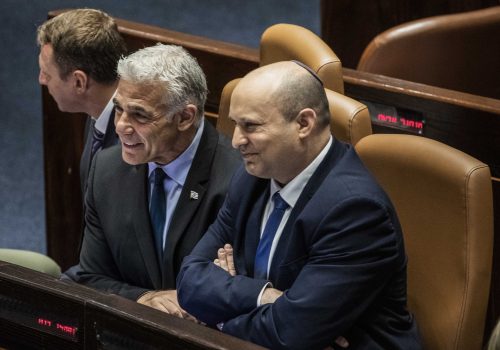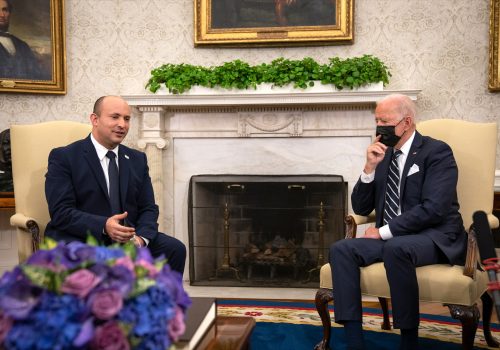Biden is visiting Israel. Travel is squarely on the agenda.
This week’s presidential visit to the Middle East will spotlight major strategic questions, such as Israeli-Saudi normalization, Iran’s nuclear ambitions, and how to revive the long-stalled Israeli-Palestinian peace process. However, one lesser-known element of Washington’s alliance with Israel will be squarely on US President Joe Biden’s agenda: Israel’s long-running quest to join America’s visa waiver program.
In his first year and a half in office, Biden has elevated the issue, and efforts to achieve Israel’s entry are gaining momentum after remaining stagnant during the Donald Trump administration. Days before the president arrived in Israel on July 7, the two countries signed a critical data-sharing agreement. A week earlier, on June 28, US Ambassador to Israel Thomas Nides highlighted the issue and appealed to Israeli leaders not to “lose momentum,” as the country heads to its fifth election in less than four years.
Joining the Visa Waiver Program—known by its acronym “VWP”—would be potentially transformative for the Israeli public and would also carry significant benefits for American communities, including Jewish-Americans and Arab-Americans.
Although the looming Israeli elections may temporarily delay progress—given that some US requirements need Knesset action—under Biden, the VWP has moved from the backburner to center stage in the US-Israel alliance. Today, Israel is closer than ever before to meeting the requirements to join the program.
In a soon-to-be-released study for the Atlantic Council, we detail the context, history, and current bilateral dialogue on VWP—an exclusive group largely made up of European nations and a handful of other countries, including Chile and Singapore.
Since the United States and Israel have such an extraordinarily intimate and unique relationship, it’s surprising to some that Israel has not been admitted already. Israel is, by far, the largest recipient of US foreign assistance, following the signing of a $38 billion, ten-year Memorandum of Understanding for security assistance in 2016. The countries’ intelligence, defense, and security communities maintain exceptionally close ties. Israel was the first country to sign a free trade agreement with the United States. Both countries boast large, growing, and closely connected expatriate and exchange populations. Regardless of party or political stripe, leaders of both countries cite the alliance’s “special” standing and the countries’ shared interests and values.
However, one arena where US-Israel relations lag is in the seemingly mundane, but important area of travel visas, particularly considering the growing people-to-people ties between the two societies. For decades, Americans have been able to travel freely to Israel without the need to apply for a visa. But most Israelis continue to face a significant hurdle by being required under US immigration law to get a visa before traveling to the United States.
Americans entering Israel for short-term visits typically need no prior visa planning and automatically receive a three-month entry visa upon arrival. That said, some communities face major challenges. Some Arab-Americans and Muslim-Americans “have experienced significant difficulties and unequal and occasionally hostile treatment at Israel’s borders and checkpoints,” as the State Department describes in its travel advisory.
Israel’s VWP admission would address this issue to a significant extent via the program’s Congressional-mandated reciprocity terms, an important subject we address in the forthcoming Atlantic Council study.
Without VWP, Israelis are subject to the complicated, expensive, and occasionally uncertain visa application process that applies to all but those countries in the program. The travel and visa hurdles are a point of frustration for many Israelis, who seek easier access to the United States, the country with which many Israelis feel most aligned.
Some factors that have stood in the way of Israel qualifying for the program are its need to comply with VWP requirements for data-sharing, lowering visa “refusal rates,” and the requirement for reciprocal treatment for eligible US citizens, regardless of background. In earlier phases of the bilateral discussions, which we detail in the study, some Israeli officials and advocates in the US sought exceptions for Israel—a tactic that appears to have fallen by the wayside, as officials from both sides focus on “fulfilling the requirements,” to quote President Biden in his Oval Office meeting with former Prime Minister Naftali Bennett last year.
All eyes this week may be on the big strategic issues. However, there is no doubt that the Israeli public, and several American communities, have a lot at stake when it comes to the ongoing talks about travel.
Ruth Eglash is a longtime journalist based in Israel. She has written for a wide variety of publications, including the Jerusalem Post, the Washington Post, and Jewish Insider. Follow her on Twitter: @reglash.
Scott Lasensky is a former senior policy advisor on Israel during the Barack Obama administration. He is co-author of The Peace Puzzle: America’s Quest for Arab-Israeli Peace. Follow him on Twitter: @scottlasensky.
Further reading
Tue, Jul 12, 2022
Biden’s big chance to build a new coalition in the Middle East
New Atlanticist By Daniel B. Shapiro
A regional coalition is emerging of US partners who face common security threats and share similar social, economic, energy, and climate-related challenges.
Wed, Jul 6, 2022
There’s uncertainty in Israel and within the Palestinian Authority. The US’s stabilizing role is critical more than ever.
MENASource By Ksenia Svetlova
When China and Russia are keen to deepen their influence in the Middle East and American allies in the region are doubtful about the future, it is up to the United States to provide the stability and firmness that is lacking in today’s regional landscape.
Fri, Jun 24, 2022
The Israeli government collapse was a curveball for Biden’s upcoming visit. But it shows the depth of the US-Israel relationship.
MENASource By Daniel B. Shapiro
President Joe Biden’s team was thrown a curveball on June 20, as the year-old coalition built by Prime Minister Naftali Bennett and Foreign Minister Yair Lapid finally gave way to internal pressures.
Image: Israeli and American flags stand during the final rehearsal for the ceremony to welcome U.S. President Joe Biden ahead of his visit to Israel, at Ben Gurion International airport, in Lod near Tel Aviv, Israel July 12, 2022. REUTERS/Amir Cohen


